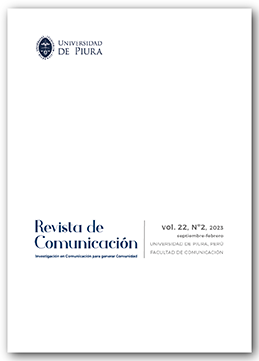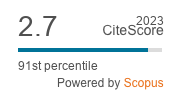Post-truth strategies and disinformation in the 2022 Colombian presidential elections
DOI:
https://doi.org/10.26441/RC22.2-2023-3270Keywords:
post-truth, disinformation, elections, Colombia, fallaciesAbstract
Mis/disinformation and post-truth discourses are part of contemporary public communication. The aim is to identify the politicians' discursive strategies and those who want to discredit them through false or inaccurate content circulating on social networks and other media. In particular, the analysis focuses on the 2022 presidential elections in Colombia. The specific objectives were: to establish the formal characteristics of the false or imprecise messages that refer to or were attributed during the campaign to the candidates Gustavo Petro, from the Pacto Histórico party, and Rodolfo Hernández, from the Movement of Anti-Corruption Governors, determine the semantic orientation of these messages and identify the types of fallacies used in their production. For this purpose, we developed content and sentiment analysis on the messages verified by fact-checkers between January and June 2022. The findings contribute to a better understanding of the post-truth strategies used by candidates and malicious agents to generate emotional responses in voters. The results revealed a prominent sentiment of negativity associated with disinformation discourse, which serves to attack, discredit, and delegitimize political contenders through especially fear-based fallacies.
Metrics
References
Allcott, H., & Gentzkow, M. (2017). Social media and fake news in the 2016 election. Journal of Economic Perspectives, 31(2), 211-236. https://doi.org/10.1257/jep.31.2.211. DOI: https://doi.org/10.1257/jep.31.2.211
Audi, R. (2004). Diccionario Akal de Filosofía. Madrid, España. Ediciones Akal S. A.
Bennett, W. L., y Livingston, S. (2021). The Disinformation Age. Politics, Technology, and Disruptive Communication in the United States. Cambridge University Press. https://doi.org/10.1017/9781108914628 DOI: https://doi.org/10.1017/9781108914628
Borges-Junior, E. (2019). What is the post-truth? Elements for a critique of the concept. Brazilian Journalism Research, 15(3), 496-513. https://doi.org/10.25200/BJR.v15n3.2019.1189 DOI: https://doi.org/10.25200/BJR.v15n3.2019.1189
Campos-Domínguez, E., Esteve del Valle, M., & Renedo Farpón, C. (2022) Retóricas de desinformación parlamentaria en Twitter. Comunicar, 72. https://doi.org/10.3916/C72-2022-04.
Carrera, P. (2018). Estratagemas de la posverdad. Revista Latina De Comunicación Social, 73, 1469-1481. https://doi.org/10.4185/RLCS-2018-1317. DOI: https://doi.org/10.4185/RLCS-2018-1317
Copi, I. & Cohen, C. (2013). Introducción a la lógica. Limusa. Recuperado de https://logicaformalunah.files.wordpress.com/2017/01/irving_m_copi_carl_cohen_introduccion_a_la_log.pdf.
Dajer, D. (2021). Colombia: The use of social media in democratic spaces: a double-edged sword. En L. Schirch (Ed.), Social Media Impacts on Conflict and Democracy (pp. 59-80). Routledge. https://doi.org/10.4324/9781003087649. DOI: https://doi.org/10.4324/9781003087649-4
DANE. (2019). Encuesta de cultura política (ECP). Recuperado de https://bit.ly/39qnA1o.
Edelman. (2022). Edelman Trust Barometer. https://www.edelman.com/trust/2022-trust-barometer.
Fallis, D. (2015). What Is Disinformation? Library Trends 63(3), 401-426. https://doi.org/10.1353/lib.2015.0014. DOI: https://doi.org/10.1353/lib.2015.0014
Festinger, L. A (1957). Theory of Cognitive Dissonance. Stanford University Press. DOI: https://doi.org/10.1515/9781503620766
Gaber, I., & Fisher, C. (2021). “Strategic Lying”: The Case of Brexit and the 2019 U.K. Election. The International Journal of Press/Politics, 27(2), 460-477. https://doi.org/10.1177/1940161221994100. DOI: https://doi.org/10.1177/1940161221994100
Giglietto, F., Iannelli, L., Valeriani, A., & Rossi, L. (2019). ‘Fake news’ is the invention of a liar: How false information circulates within the hybrid news system. Current Sociology, 67(4), 625–642. https://doi.org/10.1177/0011392119837536 DOI: https://doi.org/10.1177/0011392119837536
González-González, F. (2014). Poder y violencia en Colombia. Odecofi –Cinep.
González, M. F. (2017). La “posverdad” en el plebiscito por la paz en Colombia. Nueva Sociedad, 269, 114-126. Recuperado de https://biblat.unam.mx/es/revista/nueva-sociedad/articulo/la-posverdad-en-el-plebiscito-por-la-paz-en-colombia.
Gutiérrez-Coba, L., Coba-Gutiérrez, P., & Gómez-Díaz, J. A. (2020). La Noticias falsas y desinformación sobre el Covid-19: análisis comparativo de seis países iberoamericanos. Revista Latina De Comunicación Social, (78), 237-264. https://doi.org/10.4185/rlcs-2020-1476. DOI: https://doi.org/10.4185/RLCS-2020-1476
Gutiérrez Morales, I. M. (2020). Falacias en los discursos de los candidatos presidenciales en México (2012). Revista Latinoamericana De Estudios Del Discurso, 12(2), 11–32. Recuperado de https://periodicos.unb.br/index.php/raled/article/view/33459. DOI: https://doi.org/10.35956/v.12.n2.2012.p.11-32
Hamblin, C. (1970). Fallacies. Methuend & Co. Recuperado de https://fdocuments.in/document/hamblin-charles-fallacies.html?page=22.
Hernández-Cadena, F., Morales, Á L., Camiña, P., Vargas-Pulido, J. D., & Espeleta, C. (2018). Impacto de las redes sociales en el proceso electoral colombiano. In Misión de Observación Electoral (Ed.), Medios de comunicación, redes sociales y democracia. Elecciones presidenciales y legislativas 2018 (pp. 17-38).
Jagers, J. & S. Walgrave. (2007). Populism as Political Communication Style: An Empirical Study of Political Parties’ Discourse in Belgium. European Journal of Political Research, 46, 319-345. DOI: https://doi.org/10.1111/j.1475-6765.2006.00690.x
Lazer, D. M., Baum, M. A., Benkler, Y., Berinsky, A. J., Greenhill, K. M., Menczer, F., Metzger, M. J., Nyhan, B., Pennycook, G., & Rothschild, D. (2018). The science of fake news. Science, 359(6380), 1094-1096. https://doi.org/10.1126/science.aao2998. DOI: https://doi.org/10.1126/science.aao2998
Liu, B. (2010). Sentiment Analysis and Subjectivity. In Indurkhya, Nitin & Fred J. Damerau (editors): Handbook of Natural Language Processing, Second Edition. CRC Press.
Lombana-Bermúdez, A., Vallejo Mejía, M., Gómez-Céspedes, L. M., & Pino-Uribe, J. F. (2022). Cámaras de eco, desinformación y campañas de desprestigio en Colombia. Un estudio de Twitter y las elecciones locales de Medellín en 2019. Política Y Gobierno, 29(1), 1-30. http://www.politicaygobierno.cide.edu/index.php/pyg/article/view/1494.
López López, J, Velandia Sedano, M, Cuéllar Aragón, D, Cantor Orozco, M, Rincón Ruiz, M, Alvarado-Vivas, S y García Jurado, M. (2022). Claudia López y los pájaros azules: sexismo, ataques personales y falacias en Twitter Colombia. Universidad Santo Tomás. DOI: https://doi.org/10.2307/j.ctv31vqnc8
Lutz, B. y Padilla, A. (2015). El rumor del nopal chino: construcción institucional y efectos sociales de noticias falsas. Comunicación y Sociedad, 17, 179-204. https://doi.org/10.32870/cys.v0i17.279. DOI: https://doi.org/10.32870/cys.v0i17.279
Manfredi, J. L., Amado, A. & Gómez-Iniesta, P. (2022). Desinformación de Estado: emociones al servicio de la causa. Communication & Society, 35(2), 205-221. https://doi.org/10.15581/003.35.2.205-221. DOI: https://doi.org/10.15581/003.35.2.205-221
Medina-Uribe, P. (2018). In Colombia, a WhatsApp campaign against Posverdad. The Wilson Quarterly. Recuperado de https://bit.ly/3RKlqR0.
Mejía-Cortés, J. D. (2018). Comunicación política y posverdad: expresiones discursivas de la oposición al plebiscito en Colombia 2016. Diálogos de Derecho y Política, 20, 8-41. http://aprendeenlinea.udea.edu.co/revistas/index.php/derypol/article/view/332509/20788402. Molina-González, M. D., Martínez-Cámara, E., Martín-Valdivia, M.T. & Perea-Ortega, J.M. (2013). Semantic orientation for polarity classification in Spanish reviews. Expert Systems with Applications, 40(18):7250–7257. DOI: https://doi.org/10.1016/j.eswa.2013.06.076
Morales-Romero, F. B., & Martínez-Martínez, R. R. (2020). La posverdad: identidades colectivas que degeneran las democracias. Anagramas Rumbos y Sentidos de la Comunicación, 19(37), 111-126. https://doi.org/10.22395/angr.v19n37a6. DOI: https://doi.org/10.22395/angr.v19n37a6
Moreno-Ortiz, A. (2017). Lingmotif: A User-focused Sentiment Analysis Tool. Procesamiento del Lenguaje Natural, 58, 133-140. Recuperado dehttps://rua.ua.es/dspace/bitstream/10045/64038/1/PLN_58_16.pdf.
Newman, N., Fletcher, R., Robertson, C. T., Eddy, K. & Kleis Nielsen, R. (2022). Digital News Report 2022. Reuters Institute for the Study of Journalism. Recuperado de https://bit.ly/3OJJYYm.
Nigro, P. y Blaquier, A. (2014). Desnudando el discurso político. Falacias, políticos, periodistas. Buenos Aires: Biblos.
OEA. (2019). Guía para garantizar la libertad de expresión frente a la desinformación deliberada en contextos electorales. https://www.oas.org/es/cidh/expresion/publicaciones/Guia_Desinformacion_VF.pdf.
Orrequia-Barea, A. Moreno-Ortiz, A. Lingmotif 1.0 [Software]. (2020). Málaga: Universidad de Málaga, 2016. Revista De Humanidades Digitales, 5, 184–188. https://doi.org/10.5944/rhd.vol.5.2020.24236. DOI: https://doi.org/10.5944/rhd.vol.5.2020.24236
Pérez-Curiel, C., & Velasco-Molpeceres, A. M. (2020). Impacto del discurso político en la difusión de bulos sobre Covid-19. Influencia de la desinformación en públicos y medios. Revista Latina De Comunicación Social, (78), 65-97. https://www.doi.org/10.4185/RLCS-2020-1469. DOI: https://doi.org/10.4185/RLCS-2020-1469
Rainie, L., Anderson, J., & Albright, J. (2017). The future of free speech, trolls, anonymity and fake news online. Washington, DC: Pew Research Center.
Rincón-Martínez, M. P. (2022). Desinformación y bodegas en Twitter. El hallazgo de falsos positivos en Dabeiba, Colombia. Revista Mediterránea De Comunicación/Mediterranean Journal of Communication, 13(2), 171-184. https://www.doi.org/10.14198/MEDCOM.21818. DOI: https://doi.org/10.14198/MEDCOM.21818
Robert, A. D. y Bouillaguet A. (1997). L'analyse de contenu. Paris: PUF.
Rodríguez-Pérez, C., Calvo, D., & Campos-Domínguez, E. (2022). Fact-checking en Colombia: RedCheq en las elecciones regionales de 2019. Cuadernos.Info, (53), 46-69. https://doi.org/10.7764/cdi.53.40653. DOI: https://doi.org/10.7764/cdi.53.40653
Rodríguez-Pérez, C., & Canel, M.J. (2023). Exploring European Citizens’ Resilience to Misinformation: Media Legitimacy and Media Trust as Predictive Variables. Media and Communication, 11(2), 30-41. https://doi.org/10.17645/mac.v11i2.6317 DOI: https://doi.org/10.17645/mac.v11i2.6317
Rodríguez-Pérez, C., Ortiz-Calderón, L. S., & Esquivel-Coronado, J. P. (2021a) Desinformación en contextos de polarización social: el paro nacional en Colombia del 21N. Anagramas Rumbos Y Sentidos De La Comunicación, 19(38), 129-156. https://doi.org/10.22395/angr.v19n38a7. DOI: https://doi.org/10.22395/angr.v19n38a7
Rodríguez-Pérez, C., Paniagua-Rojano, F. J., & Magallón-Rosa, R. (2021b) Debunking Political Disinformation through Journalists’ Perceptions: An Analysis of Colombia’s Fact-Checking News Practices. Media and Communication, 9(1), 264-275. https://doi.org/10.17645/mac.v9i1.3374. DOI: https://doi.org/10.17645/mac.v9i1.3374
Romero-Moreno, M., & Arroyave Cabrera, J. (2022). Tweets y polarización. Revista Eletrônica De Estudos Integrados Em Discurso E Argumentação, 22(esp), 111-129. https://doi.org/10.47369/eidea-22-esp.-3546 DOI: https://doi.org/10.47369/eidea-22-esp.-3546
Salaverría, R., Buslón, N., López-Pan, F., León, B., López-Goñi, I., & Erviti, M.-C. (2020). Desinformación en tiempos de pandemia: Tipología de los bulos sobre la Covid-19. El Profesional de la Información, 29(3). https://doi.org/10.3145/epi.2020.may.15. DOI: https://doi.org/10.3145/epi.2020.may.15
Saura, J.R., Palos-Sánchez, P., & Ríos Martín, M.A. (2018). Attitudes Expressed in Online Comments about Environmental Factors in the Tourism Sector: An Exploratory Study. Int. J. Environ. Res. Public Health, 15. https://doi.org/10.3390/ijerph15030553. DOI: https://doi.org/10.3390/ijerph15030553
Serrano-Puche, J. (2021). Digital disinformation and emotions: exploring the social risks of affective polarization. International Review of Sociology, 31(2), 231-245. https://doi.org/10.1080/03906701.2021.1947953 DOI: https://doi.org/10.1080/03906701.2021.1947953
Sindermann, C., Cooper, A., & Montag, C. (2020). A short review on susceptibility to falling for fake political news. Current Opinion in Psychology, 36, 44-48. https://doi.org/10.1016/j.copsyc.2020.03.014. DOI: https://doi.org/10.1016/j.copsyc.2020.03.014
Strapparava, C. (2016). Emotions and NLP: Future Directions. En Proceedings of NAACL-HLT 2016. Association for Computational Linguistics DOI: https://doi.org/10.18653/v1/W16-0430
Tandoc, E. C., Lim, Z. W., & Ling, R. (2018). Defining “fake news”. A typology of scholarly definitions. Digital Journalism, 6(2), 137-153. https://doi.org10.1080/21670811.2017.1360143. DOI: https://doi.org/10.1080/21670811.2017.1360143
Tucker, J. A., Guess, A., Barberá, P., Vaccari, C., Siegel, A., Sanovich, S., Stukal, D., & Nyhan, B. (2018). Social Media, Political Polarization, and Political Disinformation: A Review of the Scientific Literature. DOI: https://doi.org/10.2139/ssrn.3144139
Vega, L. (2008). La argumentación a través del espejo de las falacias. In Santibánez, C. & Marafioti, R, De las falacias. Argumentación y comunicación. Buenos Aires: Biblos, pp. 185-208.
Waisbord, S. (2018). The elective affinity between post-truth communication and populist politics. Communication Research and Practice, 4(1), 17-34. https://doi.org/10.1080/22041451.2018.1428928. DOI: https://doi.org/10.1080/22041451.2018.1428928
Wardle, C., & Derakhshan, H. (2017). Information Disorder: Toward an interdisciplinary framework for research and policymaking. Council of Europe Report, DGI (2017), 9. Recuperado de https://rm.coe.int/information-disorder-toward-an-interdisciplinary-framework-for-researc/168076277c.
Downloads
Published
How to Cite
Issue
Section
License
Copyright (c) 2023 Revista de Comunicación

This work is licensed under a Creative Commons Attribution-NonCommercial-NoDerivatives 4.0 International License.












 Portal de Revistas de la Universidad de Piura.
Portal de Revistas de la Universidad de Piura.